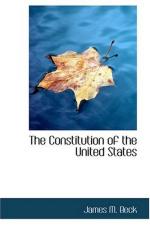Now follows the least known chapter in American history. It was a period of travail, of which the Constitution of the United States and the present American nation were born. The government slowly succumbed from its own weakness to its inevitable death. Only the shreds and patches of authority were left. Gradually the union fell apart. Of the Continental Congress only fifteen members, representing seven colonies, remained to transact the affairs of the new nation. The army, which previously to the termination of the war had dissolved by the hundreds, was now unpaid and in a stale of revolt. Measure after measure was proposed in Congress to raise money to pay the interest on the bonded indebtedness, which was in arrears, and to provide funds for the most necessary expenses, but these failed, in Congress for the want of the necessary nine votes or, if enacted, the States treated the requisitions with indifference. The currency of the United States had fallen almost as low as the Austrian kronen, and men derisively plastered the walls of their houses with the worthless paper of the Continental Congress. Adequate authority no longer remained to carry out the terms of the treaties with England and France, and they were nullified by the failure of the infant nation to comply with its own obligations and the consequent refusal of the other contracting parties to comply with theirs. The government made a call upon the States to raise $8,000,000 for the most vital needs, but only $400,000 was actually received. Then Congress asked the States to vest in it the power to levy a tax of five per cent, on imports for a limited period, but, after waiting two years for the action of the States, less than nine concurred. The States were then asked to pledge their own internal revenue for twenty-five years to meet the national indebtedness, but this could only be done by unanimous consent, and while twelve States concurred, Rhode Island refused and the measure was defeated. It was again the infinite folly of the liberum veto which, prior to the great partition, condemned Poland to chronic anarchy.
The impotence of the new government, which was still sitting in Philadelphia, can be measured by the fact that on June 9, 1783, word came that eighty soldiers were on their way to Philadelphia to demand relief. They stacked their arms in front of the State House, where the Congress was then sitting, and refused to disband, when requested by Col. Alexander Hamilton, as the representative of the Congress, to do so. When Congress appealed to the government of Pennsylvania for protection, it was advised that the Pennsylvania militia was likewise insubordinate. The Congress then hastily fled by night and became a fugitive.
The impotence of the Confederation can be measured by the fact that in the last fourteen months of its existence its receipts were less than $400,000, while the interest on the foreign debt alone was over $2,400,000, and the interest on the internal debt was five-fold greater.




